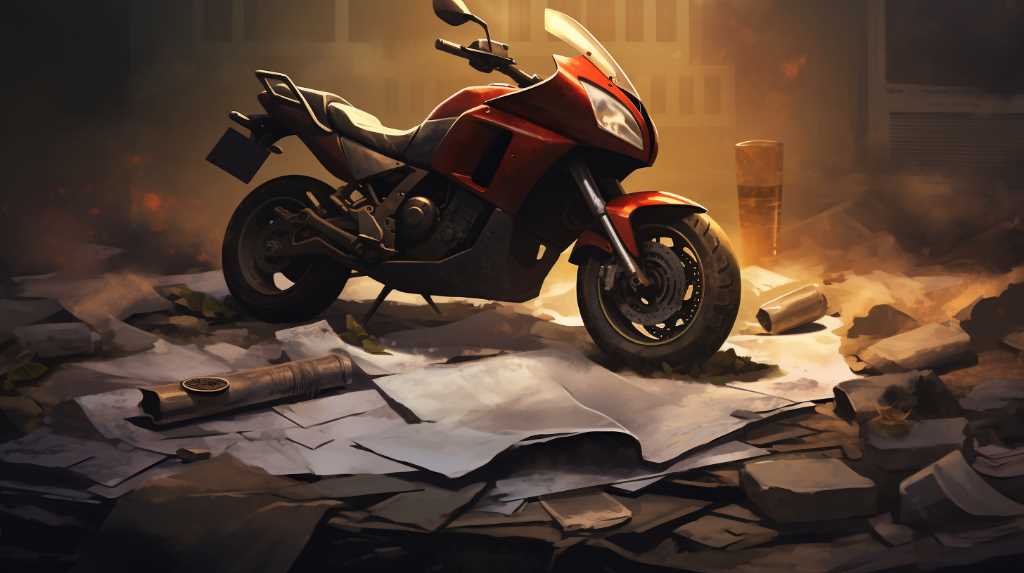
If you’re at fault in a motorcycle crash, getting money for damages isn’t straightforward, but it’s possible. When figuring out who pays for what, it’s important to look at how much the crash was your fault.
Even if you made some mistakes, you might still get some money back because of the way the law looks at shared blame. Also, if you have insurance that covers you regardless of who’s at fault, like personal injury protection, this can help with your costs.
You can also see if someone else involved might owe you something. To get a clear picture of your chances for getting money, you need to dig into the details of the crash, what your insurance says, and ways to lower the amount you have to pay.
For motorcyclists who caused their own accident, this information is very important.
Understanding Comparative Fault
Examining comparative fault is crucial when determining compensation eligibility for individuals involved in motorcycle accidents where blame may be shared. This legal doctrine acknowledges that multiple parties can be simultaneously responsible for an accident, allocating fault in proportion to each party’s contribution to the incident.
If you are a motorcyclist partially at fault, it does not necessarily bar you from recovery; instead, any compensation awarded to you may be reduced by your percentage of fault. Understanding the nuances of comparative fault is vital, as it directly influences the potential financial recovery.
Motorcycle riders should be aware of their state’s specific laws regarding comparative fault, as these can significantly affect the outcome of a claim. Legal counsel can provide guidance on how comparative fault may apply to an individual case.
No-Fault Insurance Explained
Following the analysis of comparative fault, it is essential to understand no-fault insurance, which allows motorcyclists to receive compensation for certain losses regardless of who caused the accident.
No-fault insurance is designed to streamline the claims process by minimizing the need to establish fault in an accident. Policyholders can claim benefits for medical expenses, loss of income, and other reasonable and necessary costs incurred as a result of the accident. This coverage is typically quick and uncomplicated, ensuring that injured parties receive financial support without delay.
It is important to note that no-fault insurance does not cover property damage or pain and suffering, and its availability varies by state. Motorcyclists should review their policy details and state regulations to fully understand the scope and limitations of no-fault coverage.
Role of Personal Injury Protection
Personal Injury Protection, or PIP, is like extra insurance for motorcycle riders. It helps pay for medical costs and lost wages if you get into an accident, no matter who was at fault. The point of PIP is to make sure you get money quickly to cover your expenses without having to argue about who caused the crash. This is really helpful for motorcycle riders because it means they can worry less about money problems after an accident.
When you have PIP, you can get the care and help you need right away. It’s a smart move to protect yourself from losing money while you’re healing from any injuries you got from a motorcycle crash. With PIP, you don’t have to wait to find out who was at fault before you can start taking care of your health and your bills.
Third-Party Claims Opportunities
Sometimes, even if a motorcyclist is partly to blame for an accident, they can still ask for money through a third-party claim. This is especially true in places with laws called ‘comparative negligence.’ These laws say you can get paid for damage even if you were somewhat at fault.
If someone else, like another driver, a company that made the motorcycle, or the local government, is also at fault, you might be able to make a third-party claim. It’s important for motorcyclists to know that getting money doesn’t always depend on the other person being totally at fault.
Looking closely at what happened in the accident can show you ways to get help that you might not see right away. That’s why it’s a good idea to talk to a lawyer to find out about all the ways you might be able to get compensated.
Mitigating Damages and Liability
If you’re in a motorcycle accident, it’s very important to do certain things right away to help with your case. First, you should get medical help to show that you’re taking care of yourself and to document your injuries. Make sure you don’t say it was your fault, and try to take pictures or notes about what happened. This shows you’re handling the situation carefully.
Wearing the right safety gear like helmets, keeping your motorcycle license up to date, and following all the driving rules are also important. Doing these things can help prove you’re a safe rider, which might mean you’re less to blame for the accident.
Taking these steps is good not just for any court cases but also for keeping everyone on the road safer. It’s like wearing a seatbelt—it’s a simple action that can make a big difference in safety and in the law.
Conclusion
If you’re at fault in a motorcycle crash, getting money for your injuries can be tricky. But it’s not impossible. Here’s what you need to know:
- Some insurance plans, like Personal Injury Protection, pay out no matter who caused the accident.
- You can also make claims against others involved for more money.
- Just remember, it’s important to do what you can to keep damage and blame low.
- Knowing how these rules work helps a lot if you’re trying to get compensated after a crash you caused.